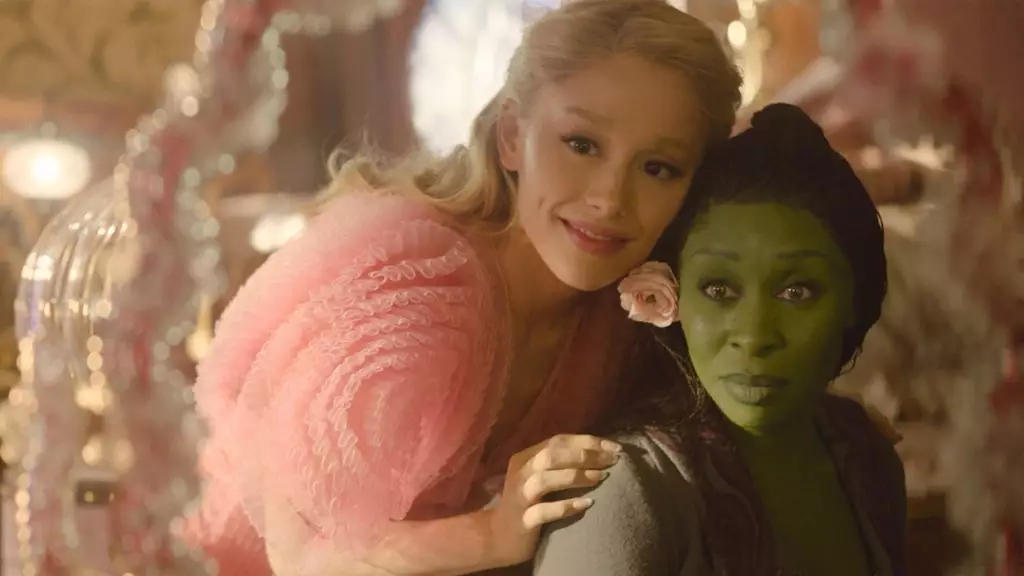In a bizarre twist of events that has sent ripples of laughter and disbelief throughout social media, toy giant Mattel has found itself at the center of an unfortunate packaging error involving their newly launched Wicked doll collection. Intended as a tribute to the popular film adaptation of the Tony Award-winning musical, the dolls are modeled after renowned performers Cynthia Erivo and Ariana Grande, but due to a problematic URL printed on their boxes, the products have taken a comically inappropriate turn.
The doll packaging was meant to guide consumers to the official website, WickedMovie.com, a destination teeming with family-friendly content related to the film. However, due to a misprint, the link instead directs eager fans to a different website entirely—one requiring an 18+ verification that leads to the adult film company, Wicked Pictures. Established in 1993, Wicked Pictures has long been associated with the adult film industry, providing a stark contrast to the innocent world of dolls aimed at children.
As news of this oversight broke, consumers took to social media platforms to express both their shock and amusement. One infamously viral tweet encapsulated the absurdity of the situation with an image of the wayward packaging alongside a crying face emoji. Parents and guardians were left bewildered, considering the likelihood that young children would be the primary audience for these dolls. The collective outrage directed towards Mattel has triggered discussions about the critical importance of proofreading and quality control, especially in products geared towards children.
In a timely response, Mattel issued a statement acknowledging the error and expressing regret over the situation. They urged consumers who have purchased the dolls to either discard the packaging or obscure the erroneous link. This proactive stance demonstrates the company’s understanding of the serious implications of their mistake, even if the blunder has led to a swell of online memes and jokes at their expense.
While the immediate fallout from this error has been largely comedic, it sheds light on the essential role of editorial oversight in the production of consumer products. In an age where the internet facilitates instant information sharing, a simple typo can lead to a swift and far-reaching backlash, tarnishing a reputable brand’s image in the process. The Wicked dolls’ packaging incident serves as a stark reminder that regardless of the industry, the importance of accuracy cannot be overstated.
Furthermore, this incident inadvertently highlights the blurred lines between childhood innocence and adult content. As a culture, we’ve become increasingly aware of the content we expose to younger audiences. The fact that a toy marketed to children could mistakenly connect them with adult material sparks necessary conversations regarding consumer awareness and responsibility.
This miscommunication occurred amidst excitement surrounding the upcoming film “Wicked,” set to be released on November 22, which reimagines the story of “The Wizard of Oz.” Directed by Jon M. Chu, it takes audiences on a journey through the complex relationship between Elphaba, the misunderstood Wicked Witch of the West, and Glinda, the Good Witch, with a star-studded cast that promises to captivate viewers. While this doll line aimed to celebrate the film, the botched URL has instead thrust Mattel into unwanted headlines, overshadowing the excitement of the movie’s premiere.
As the release date approaches, fan anticipation continues to build for the film and its accompanying merchandise. Mattel must now navigate the perception that, although they’ve made a hilarious blunder, they still hold the potential to produce quality products that resonate with their young audience. The challenge now is twofold: rectify the packaging issue and reassure consumers of their commitment to providing family-friendly entertainment.
In retrospect, while the Wicked dolls’ packaging blunder has elicited laughter, it also serves as a teachable moment in the realms of publishing and product development. One simple misprint can have complex implications, and as Mattel takes steps to remedy the situation, they must also consider reinforcing their editorial standards to avoid similar mistakes in the future. After all, in a world where mistakes can lead to unexpected hilarity, it’s crucial to balance humor with responsibility—especially when children are involved.

